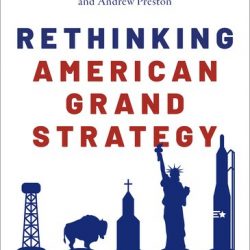Grand Strategy defines the broad goals of nations or even groups. American Grand Strategy is best understood historically, as an amalgam of influences and interests. Is American grand strategy a reaction to events and domestic interests, or is it derived more strategically based on the American place in the world? And what does the history of American grand strategy tell us about its current goals? We speak with three of the authors of Rethinking American Grand Strategy. Hosted by Doug Becker. [ dur: 58 mins. ]
- Christopher McKnight Nichols is Associate Professor of History and Director of the Center for the Humanities at Oregon State University. He is the author of Promise and Peril: America at the Dawn of a Global Age. He is also co-author of the opinion articles “‘Grand strategy’ has a bad rep. To fix it, get beyond hard power and traditional statecraft”, in the Los Angeles Times, and “America’s traditions pose an obstacle to preventing future pandemics”, in the Washington Post.
- Beverly Gage is Brady-Johnson Professor of Grand Strategy and Professor of History & American Studies at Yale University. She is the author of The Day Wall Street Exploded: A Story of America in its First Age of Terror and a forthcoming biography on J. Edgar Hoover.
- Kate Epstein is Associate Professor of History at Rutgers University-Camden. She is the author of Torpedo: Inventing the Military-Industrial Complex in the United States and Great Britain.
All of our guests are contributors to the book we are discussing today Rethinking American Grand Strategy. Christopher McKnight Nichols is also co-editor of the book together with Elizabeth Borgwardt and Andrew Preston.
Recorded June 2021.
This program is produced by Ankine Aghassian, Doug Becker, Melissa Chiprin, Mihika Chechi, and Sudd Dongre.
Podcast: Play in new window | Download (Duration: 58:01 — 53.1MB) | Embed
Subscribe: Apple Podcasts | Spotify | RSS
